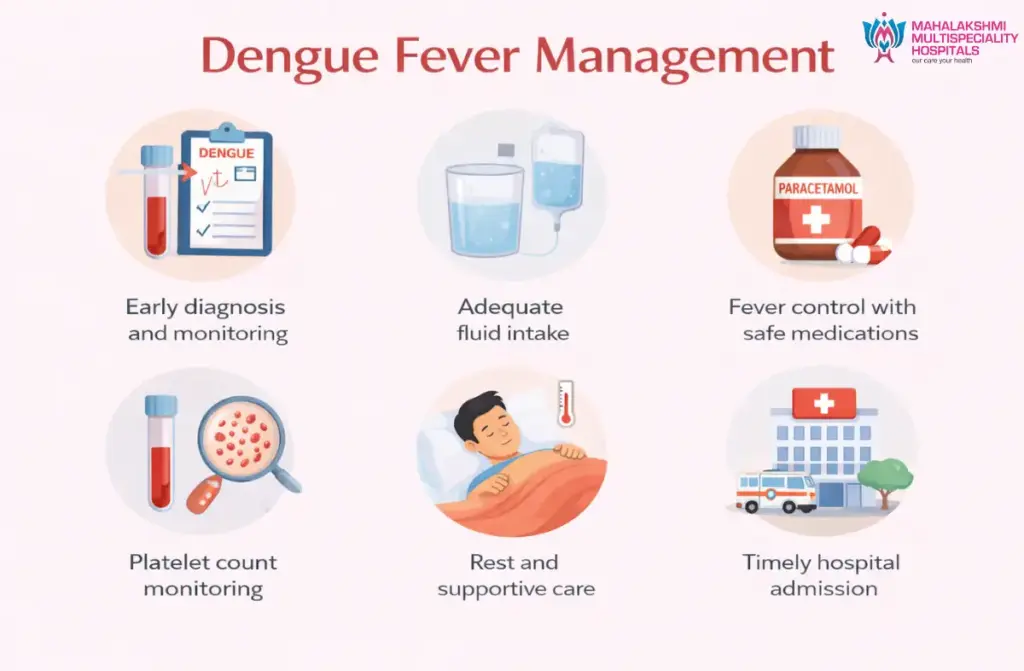When dengue strikes, the right medical approach can make all the difference in recovery. In Ulundurpet, healthcare providers emphasize accurate diagnosis, symptom management, and continuous monitoring to ensure patients remain stable. Supportive methods such as fluid replacement, rest, and fever control are central to care. With this focused approach, dengue fever treatment in Ulundurpet is designed to minimize risks and promote safe healing.
What is Dengue?
Dengue is a mosquito-borne viral infection mainly spread by the Aedes aegypti mosquito, which bites during the day and causes symptoms such as high fever, intense body pain, headache, and skin rashes. The illness can range from mild cases that improve with proper rest and fluids to severe conditions that lead to low platelet counts, bleeding, and serious complications if left untreated. Since there is no direct antiviral cure, the best treatment for dengue fever in Ulundurpet focuses on supportive care, including fluid management, fever control, and continuous monitoring of the patient’s condition, ensuring timely intervention for safe recovery.
Causes
- Mosquito Bite: Dengue fever is caused by the bite of infected Aedes aegypti mosquitoes, which are active during the day and breed in stagnant water. Preventing bites is crucial, and timely dengue fever treatment in Ulundurpet helps manage symptoms effectively.
- Stagnant Water and Poor Sanitation: Stagnant water and improper waste disposal create ideal mosquito breeding grounds, increasing the risk of infection. Controlling these areas supports prevention alongside proper dengue fever treatment.
- Climate and Seasonal Factors: Warm, humid conditions and monsoon rains boost mosquito populations, leading to higher dengue cases. Early awareness and access to dengue fever treatment reduce the risk of complications.
Symptoms of Dengue Fever
- Dengue fever often begins with a sudden high fever that can reach up to 104°F, accompanied by severe headaches, joint and muscle pain, and intense fatigue. These early symptoms can resemble other viral infections, making careful monitoring essential for proper care and timely best treatment for dengue fever in Ulundurpet.
- Skin rashes may appear a few days after the fever starts, sometimes spreading across the body, along with mild bleeding symptoms such as nose or gum bleeding. Close observation of these signs allows healthcare providers to assess severity and provide the treatment for dengue fever.
- In severe cases, symptoms can progress to abdominal pain, persistent vomiting, rapid breathing, and a significant drop in platelet counts, which may lead to internal bleeding. Recognizing these warning signs early is critical for administering effective best treatment for dengue fever to prevent serious complications.

Control of Dengue Fever
- Eliminating Mosquito Breeding Sites: Controlling dengue starts with removing stagnant water from containers, flowerpots, and discarded items where mosquitoes breed. Regular cleaning and proper waste management help reduce mosquito populations and support effective dengue fever treatment in Ulundurpet when infections occur.
- Personal Protection Measures: Using mosquito repellents, wearing protective clothing, and applying insecticide sprays can minimize the risk of mosquito bites, particularly during the day when Aedes mosquitoes are active. These precautions enhance the effectiveness of fever treatment
- Community and Government Initiatives: Public awareness programs and government-led vector control measures, such as fogging and larvicidal treatments, play a crucial role in preventing dengue outbreaks. Combining these initiatives with personal preventive steps strengthens overall control and improves outcomes of dengue fever treatment.
Treatment for Dengue Fever
Treatment for dengue fever primarily focuses on supportive care, as there is no specific antiviral medication for the virus. Maintaining proper hydration through oral fluids or intravenous therapy is essential to prevent complications such as dehydration.
Fever and pain management is handled using medications like paracetamol, while avoiding drugs such as aspirin or ibuprofen that can increase the risk of bleeding. Careful symptom management ensures patient stability throughout the recovery period.
Severe cases with low platelet count or internal bleeding may require hospital in Ulundurpet, close monitoring, and blood transfusions if necessary. Prompt recognition and professional care are critical components of effective dengue fever treatment in Ulundurpet, reducing the risk of life-threatening complications.
Conclusion
Effective management of dengue fever relies on early detection, proper hydration, symptom control, and close monitoring to prevent severe complications. Medical facilities in Ulundurpet provide comprehensive care to ensure patients recover safely and efficiently. Timely intervention and professional attention are essential for positive outcomes. For advanced care and specialized services, dengue fever treatment in Ulundurpet offers experienced healthcare support to manage all stages of the illness. Prioritizing medical guidance and preventive measures ensures a safer recovery and reduces the risk of severe dengue.






